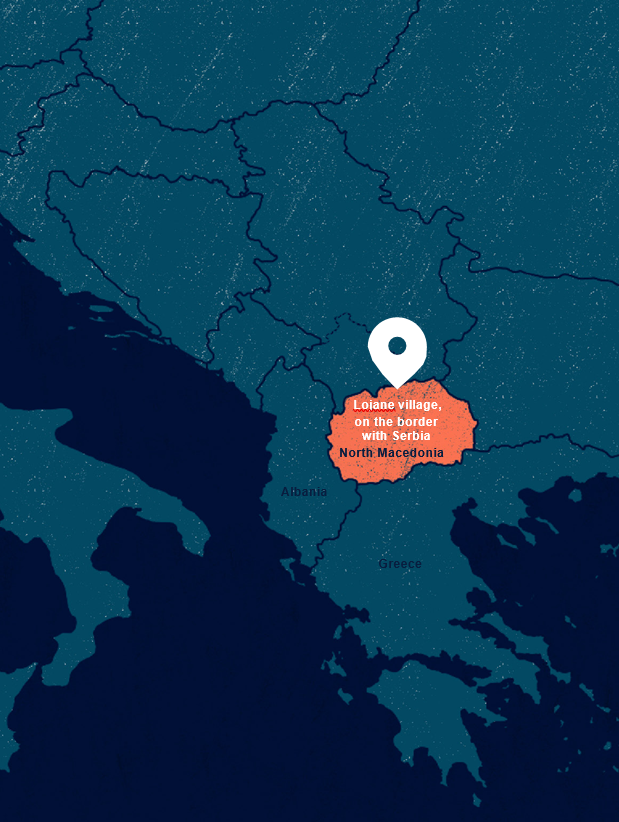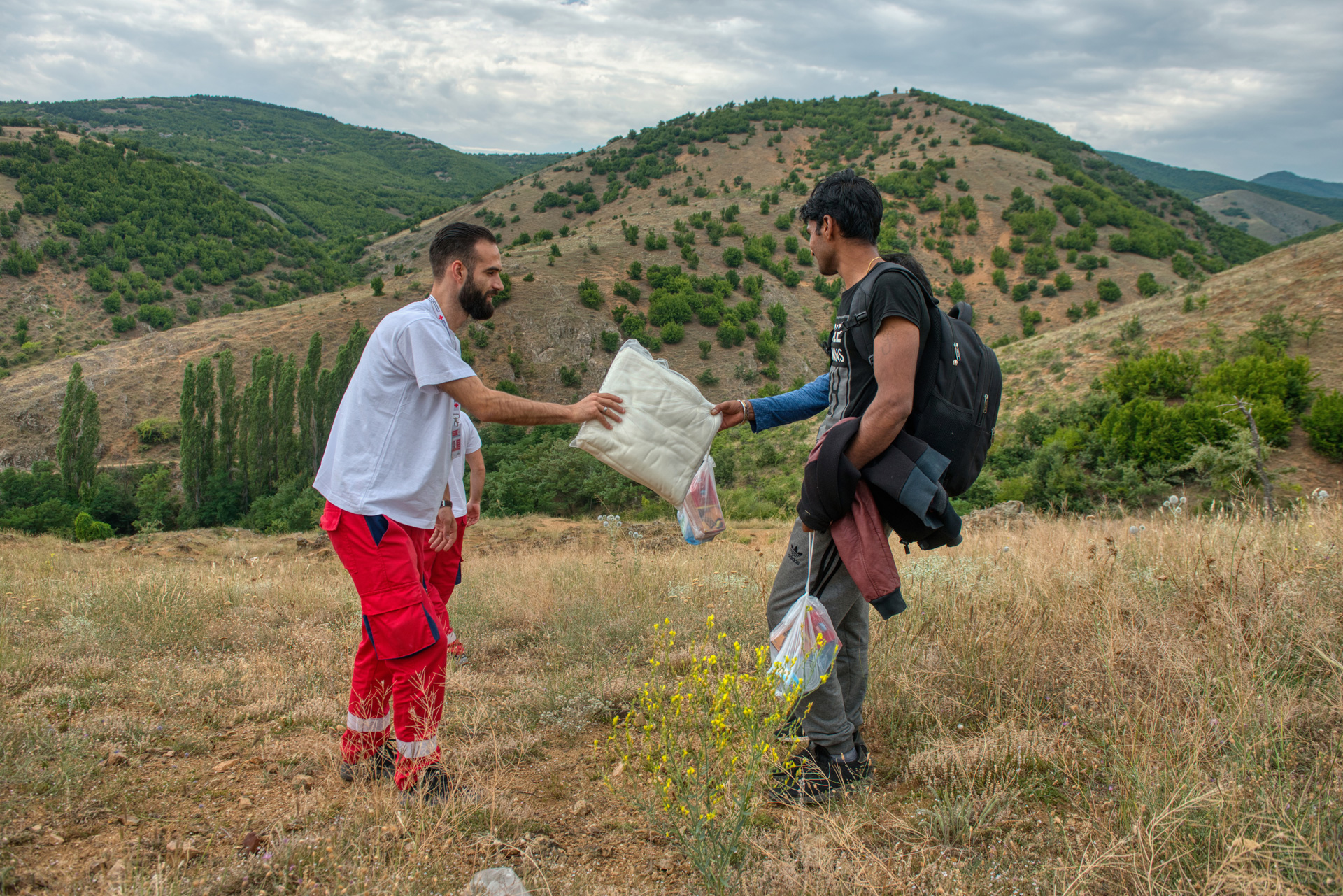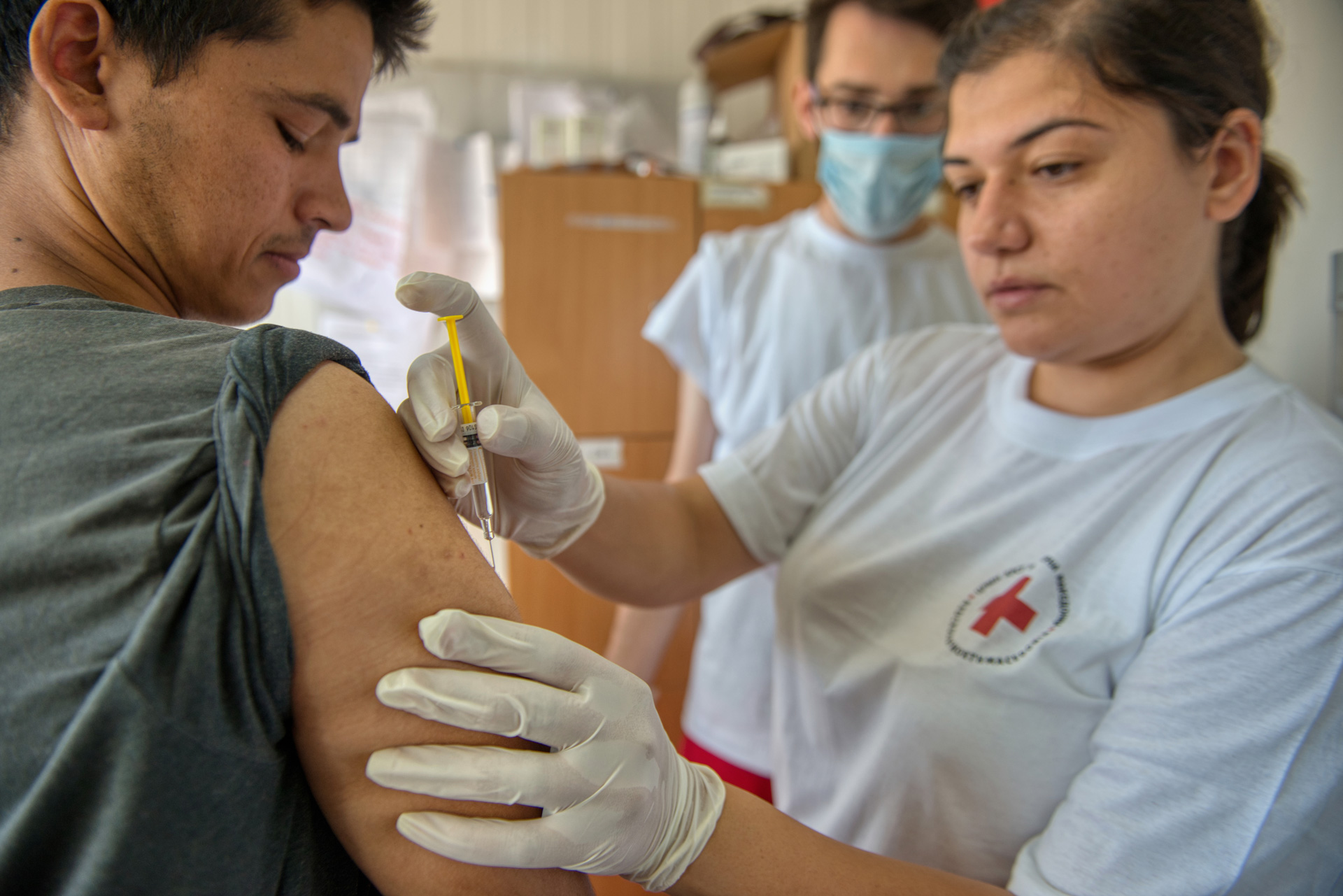HSP Case Study: Red Cross of the Republic of North Macedonia
Red Cross of the Republic of North Macedonia
Fixed and mobile Humanitarian Service Point
Lojane village, North Macedonia
2016
- Migrants and displaced persons
- Host community
- Healthcare (including first aid and psychosocial support)
- Food and water
- Non-food items
- Local transport to hospital and transit centre
- Self-protection information
- Restoring family links
- Safe referrals
North Macedonia is located in the Western Balkans, at the heart of Europe. The Western Balkan route refers to the migratory route through North Macedonia, Serbia, Albania, Bosnia and Herzegovina, Kosovo and Montenegro. It is the most active irregular route through Europe, used mostly by migrants and displaced people from Asia, Africa and the Middle East. Since 2019 the number of people travelling along the route has picked up, having steadily fallen since 2015, when a record number of migrants and displaced persons arrived in the EU. In the first ten months of 2022, 22,300 people were detected to have entered irregularly through the Western Balkan route, triple the total in 2021 and the highest number since 2015.
Migrants and displaced persons face many dangers along the Western Balkan route. Although states attempted to ‘close’ the route in March 2016, people continued to enter North Macedonia from Greece, making their way north towards the border with Serbia, transiting through a village called Lojane. The Red Cross of the Republic of North Macedonia sent a team to Lojane in August 2016 to assess humanitarian needs and discuss the situation with the local population. Migrant, displaced and local communities all welcomed the Red Cross: the host community was overwhelmed with the scale of humanitarian needs, while migrants and displaced persons, familiar with the Red Cross emblem and mandate, asked for medicine, food, clothes, blankets, protection and services to restore family links. Following discussions with local authorities, and having conducted a needs assessment across all communities, the Red Cross team decided that support should be provided in Lojane both to migrants and displaced persons and to local families in situations of vulnerability.
The Red Cross of the Republic of North Macedonia informed the National Crisis Management System about its plans, who formally approved the project, with a memorandum of understanding then signed with the Ministry of Interior. The National Society was granted a special license authorizing the teams to enter the ‘no man’s land’ in the forest along the border with Serbia to provide assistance and protection. In the early days of the operation, the official sanctioning of the Red Cross presence in the area helped to reassure local police forces about the Red Cross’ humanitarian mandate and objectives. It also contributed to strong and collaborative relationships between the HSP team and local and border police forces.
The Red Cross of the Republic of North Macedonia identified a space in a private house, strategically located on the migration route, to use as a base for operations. The team gradually equipped this fixed point with a resting space, kitchen, women’s bathroom, children’s bedroom, child-friendly space, Wi-Fi and TV.73 They developed standard operating procedures and trained the onsite team. In addition to the fixed HSP in Lojane, they sent mobile Red Cross teams out to conduct patrols, on foot and in 4x4 vehicles, to provide medical and humanitarian assistance in the border area. At first this was a 24/7 operation, but since 2018 services have been available for 12 hours each day.
“I live and volunteer in the village where I was born, more precisely in the village Lojane, where transit of migrants through RNM [North Macedonia] has been taking place for years. The smile I see on the faces of migrants after providing them with medical treatment or assistance with food and water cannot be replaced by anything else in the world. Their gratitude gives me so much satisfaction. I feel proud to be helping the vulnerable on behalf of the Red Cross. I help the migrants, but also the local population. It is an honour to wear the uniform and the emblem of the Red Cross.”
Volunteer logistician, Red Cross of the Republic of North Macedonia
The HSP teams distribute food, hygiene kits, water, blankets, ‘winter sets’ (hat, gloves and scarf) and self-protection leaflets in different languages. They provide first aid, restoring family links services and local transport to nearby hospitals and Tabanovce transit centre. They also organise referrals to other actors, for example to the Ministry of Labour and Social Policy for unaccompanied minors and to the International Organization for Migration for people interested in voluntary return.
Apart from the field coordinator, all members of the Red Cross of the Republic of North Macedonia’s fixed and mobile teams in Lojane are volunteers, including doctors, interpreters and logisticians. A certified psychologist is also available on request to provide psychosocial support and organize referrals. The size of the team changes according to need, and three-quarters of volunteers come from the local area.
Although the Red Cross of the Republic of North Macedonia’s response to the humanitarian needs of migrants and displaced persons at the Serbian border fits perfectly with the IFRC description of an HSP, it was developed before the operational model was formally set up. The HSP label was thus applied to the programme at a later stage, with the corresponding toolkit then used to further develop the services, in line with wider Red Cross and Red Crescent practices.
Community engagement and accountability activities allow the teams to collect feedback to improve the quality and relevance of their services. A National Society staff member explained that, in their view, without the HSP, “there would have been a lot of dead bodies everywhere.” According to her, since 2016 the efforts of both fixed and mobile teams have protected countless survivors of violence (including many minors) and have contributed to saving thousands of lives (including by assisting mothers to give birth). Vulnerable members of the local community are also reported to feel more protected due to Red Cross support and assistance. When asked about the proportion of people from the local population supported by the HSP, staff members who were interviewed pointed to their equal treatment of both communities, exclaiming: “we provide 100 per cent support to each community!”
“On my way to Serbia, I was injured, with two broken legs, lying on the road, helpless and exhausted from pain. Then the mobile team of the Red Cross came by. Their doctor examined me immediately and suggested hospitalization. After three weeks, I had an operation. During my hospital stay, the Red Cross did not leave me alone. They were my family in Macedonia. An additional relief was that there were Arabic translators in the Red Cross, which meant a lot to me [...] I will never be able to pay back to the Red Cross. I will never forget the treatment I received.”
Refugee from Palestine
The HSP has been active since 2016. While the Red Cross of the Republic of North Macedonia plans to continue providing services while the numbers of migrants and displaced persons travelling through Lojane remain high, it has considered an exit strategy for if and when the numbers start decreasing.
If that happens, it plans to create a local branch run by volunteers from the community, who would continue to provide services to both the local population and migrants and displaced persons.
Insights of the Red Cross of the Republic of North Macedonia
“We find people who died of hunger or froze to death, forgotten by everyone else”
Republic of North Macedonia Red Cross staff member
Every year, the mobile team finds around ten deceased or gravely wounded migrants and displaced persons in the border area (for example, people who lost limbs in car crashes or train accidents). In such cases, a clear procedure exists to transport injured people to hospital or to inform the authorities about deceased migrants and displaced persons. The HSP team explained how such activities take a heavy emotional toll on team members, who sometimes find it challenging to remain calm and professional. To address this challenge, individual and collective psychosocial support has been made available for staff and volunteers working at the HSP.



